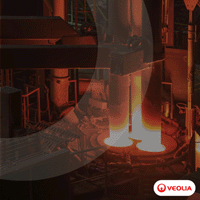ArcelorMittal Eisenhüttenstadt Aims for Maximum Efficiency; Sees Competitive Edge Threatened
09/12/2013 - The Eisenhüttenstadt steelworks in Germany is one of ArcelorMittal’s most energy-efficient production sites but says it is experiencing a considerable competitive disadvantage in Germany due to the additional burdens imposed by the German Renewable Energy Act (EEG) and the energy tax.
The Eisenhüttenstadt steelworks in Germany is one of ArcelorMittal’s most energy-efficient production sites. Vulkan Energiewirtschaft Oderbrücke (VEO) GmbH operates a power plant in Eisenhüttenstadt that uses furnace gases from ArcelorMittal Eisenhüttenstadt’s pig iron and steel production (so-called furnace gas streaming) and converts it into electrical and thermal energy — an environmentally efficient way of combining heat and power.
During a recent visit to the power plant, Annalena Baerbock, regional chair of the Green Party, and the Green MEP Reinhard Bütikofer were impressed by the importance given by Brandenburg’s largest steelworks to the environment and energy efficiency. The works already obtains a large proportion of its energy from the environmentally friendly furnace gas streaming.
ArcelorMittal has invested continuously in its plant at Eisenhüttenstadt to increase its energy efficiency and reduce power consumption.
“It is important for a forward-looking energy concept that an energy-intensive industry in particular is aware of its responsibilities in terms of climate protection. Politics and industry must work closely together on this matter. ArcelorMittal sets a good example here,” stressed Annalena Baerbock.
In the next few years the company plans to install a top gas expansion turbine in the VEO power plant and to renew the drive systems in the cold-rolling mill at Eisenhüttenstadt. “This means more than € 20 million will be invested in the site, reducing consumption and greatly increasing the proportion of electricity generated from furnace gas. From a technical point of view, no further significant efficiency increases are possible,” commented Matthieu Jehl, CEO of the Eisenhüttenstadt works.
“We already suffer a considerable competitive disadvantage in Germany due to the additional burdens imposed by the German Renewable Energy Act (EEG) and the energy tax. If the special guaranteed payment rules and reliefs were discontinued, it would mean additional annual costs for ArcelorMittal in Germany of € 170 million, of which about € 60 million would affect Eisenhüttenstadt,” added Frank Schulz, chairman of the management board of ArcelorMittal Germany, in reference to the current political discussions surrounding the EEG. “To maintain competitiveness we need stable conditions. Additional tax burdens such as are mooted in the current political debate would pose an immediate threat to our works and jobs in Germany.”



.png?lang=en-US&ext=.png)






